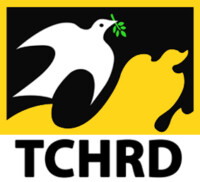
Jigme Gyatso and Lobsang Tenzin are just two of the many Tibetans imprisoned for unbelievably long periods for their political convictions. As with many other such prisoners held in Chinese prisons in Tibet, details of their arrest and detention are difficult to ascertain and even visits by family members of the prisoners are strictly controlled.
Jigme Gyatso was formerly a monk at Labrang Tashi Khyil Monastery before he left monastic life in order to marry. At the time of his arrest he was selling incense from a stall on the South Barkhor.
Jigme was reportedly arrested some time in 1987 and tried about one year later. He was then transferred from Gutsa Detention Center to Drapchi Prison and as of early 1992 was reportedly still there.
A Xinhua report of 11 March 1988 confirmed that he had been arrested and charged, apparently under article 101 of the Chinese Criminal Statute for “Counterrevolutionary propaganda and incitement”. Jigme Gyatso’s trial was attended by relatives who reported that he received a life sentence.
In November 1991 Jigme Gyatso became severely ill and was “trembling and unable to stand up”. Although he was refused medical treatment in prison, relatives were permitted to take him to a clinic for a once only visit, and by February 1992 his condition had reportedly improved. There are unconfirmed reports that Jigme Gyatso was repeatedly beaten in prison.
Lobsang Tenzin aged 31 years, was a former student of the Tibet University, Lhasa. He lived in Lhasa with his mother Dolkar and his eight brothers and sisters.
Between the age of 8 and 13 Lobsang was a student at Bonshod elementary school. From age 14 to 19 he studied at the Lhasa intermediate school and he then joined the Lhasa Tibet University at the age of 20.
On 5 March 1988 (the 17th day of the first month of the Earth Dragon year of the Tibetan Calendar), Lobsang was arrested for throwing stones and fighting with a Chinese person for the cause of Tibet. Thereafter he was implicated as the “principal culprit” in the death of a People’s Armed Police officer during the independence demonstrations in Lhasa.
Lobsang was immediately taken to Gutsa Prison where he was beaten severely with wooden sticks and iron rods. He had bruises all over his body and four large wounds on his head. Lobsang described all of these events to his mother when she visited him in prison.
On 16 April 1988, the Chinese authorities passed sentence on Lobsang. An announcement regarding his imprisonment and his expulsion from University was widely broadcast through television, radio and newspaper.
Afterwards, the Special Police brought legal notification of the arrest to his home. The notification stated: “According to Law, Lobsang Tenzin was found guilty of killing a man and has therefore been imprisoned in the Lhasa Police Detention Center”.
Since Lobsang’s imprisonment there have been just four occasions when family members have been allowed to visit him. The first visit was arranged by a Tibetan friend working at the prison and took place on 11 July 1988. His family members were horrified to see Lobsang with his feet manacled and struggling to walk.
The second meeting took place on 14 September 1988, the third on 14 November 1988 and the fourth on 15 January 1989. On each occasion there was a prison attendant present at all times to monitor the conversation.
Lobsang Tenzin’s great spirit remained alive even while in prison. He was one of the political prisoners involved in the attempt to pass a petition to James Lilley, then U.S. Ambassador to China, detailing the conditions in the prison.
Lobsang is reported to be presently serving his term in Powo Tramo Labour Camp. A recent unconfirmed report states that his sentence has been reduced to 18 years.
